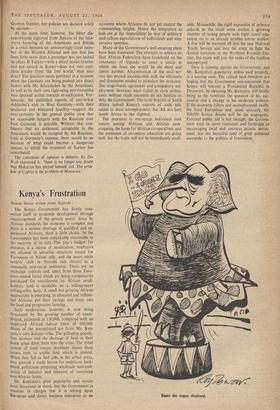Kenya's Frustration
AARON SEGAL writes from Nairobi: The Kenya Government has firmly com- mitted itself to economic development through encouragement of the private sector. Since by African standards the economy is complex and there is a serious shortage of qualified and ex- perienced Africans, there is little choice. So the Government has been remarkably reasonable in the majority of its acts. This year's budget, for instance, is a classic of moderation; employers are allowed to advertise situations vacant for Europeans or Asians only, and the smart white settlers' club in Nairobi still thrives' as a nominally non-racial institution. There are no exchange controls and, apart from those Euro- pean-owned farms which are being compulsorily Purchased for resettlement by African small- holders, land is available on a willing-buyer willing-seller basis. A small but growing African squirearchy is emerging, as educated and influen- tial Africans put their savings, and loans into the land and progressive farming.
Such moderation, however, is now being threatened by the growing number of, unem- ployed, estimated at 150,000, compared with an employed African labour force of 600,000. Many of the unemployed are from Mr. Ken- Yatta's own Kikuyu tribe. The galloping popula- tion increase and the shortage of land in their home areas drive them into the cities. The tribal system of land tenure elsewhere denies them access even to arable land ,which is unused. When they fail to find jobs in the urban areas, they provide a ready leaven for ambitious back- bench politicians proposing wholesale nationali- sation of industry and takeover, of remaining non-African farms.
Mr. Kenyatta's great popularity and stature keep discontent in check, but the Government is sensitive to charges that it is relying upon European and Asian business enterprise in an economy where Africans do not yet control the commanding heights. Hence the temptation to lash out at the 'imperialists' by way of arbitrary and callous deportations of individuals and vitu- perative speeches.
Many of the Government's well-meaning plans have been frustrated. The attempts to achieve an East African Federation have foundered on the reluctance of Uganda to enter a union in which she fears she would be the third and junior partner. Africanisation of the civil ser- vice has proved incompatible with the efficiency and dynamism needed to stimulate the economy. The wage-freeze agreement and compulsory em- ployment increases have failed to curb strikes, since militant trade unionists do not hesitate to defy the Government. The trade boycott of South Africa• halved Kenya's exports of soda ash, added to local unemployment, but did not hurt South Africa in the slightest.
The measures to encourage individual land tenure among Africans and African cash- cropping, the loans for African co-operatives, and the extension of secondary education are going well, but the fruits will not be immediately avail- able. Meanwhile, the rigid expansion of primary schools in the rural areas pushes a growing number of young people with eight years' edu- cation on to an already swollen labour market. A few will be creamed off into the new National Youth Service and into the army to fight the Somali terrorists in the Northern Frontier Dis- trict, but many will join the ranks of the landless unemployed.
Time is running against the Government, and Mr. Kenyatta's popularity, unless used properly, is a waning asset. The radical back-benchers are hoping that the Government announcement that Kenya will become a Presidential Republic in December, by elevating Mr. Kenyatta, will finally bring to the forefront the question of his suc- cession and a change in his moderate policies. If the economy falters and unemployment swells, the local Europeans and, more seriously, the 200,000 Kenya Asians will be the scapegoats. External public aid is not enough; the Govern- ment must be more consistent and forthright in encouraging local and overseas private invest- ment, lest this beautiful land of great potential succumbs to the politics of frustration.
Enter the rogue elephant.


































 Previous page
Previous page